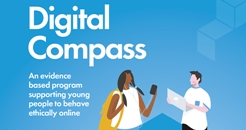 Digital Compass
Digital Compass
From an article by the Behavioral Insights Team
Digital Compass is a behaviourally informed programme, currently being rolled out in Australian schools, designed with young people to help them behave ethically online. It is a school-based intervention for Year 9 pupils which takes young people through a series of practical activities designed around common online experiences. External facilitators guide students through group discussions and core exercises.
Digital Compass is the product of co-design with young people who consistently told the developers that their online experiences don’t reflect the warnings and risks they are told about from parents, the news and school programmes. This lack of relevance, evidence and constant negativity about the online environment drives young people to disengage with their previous online safety programs.
At every stage of rollout, facilitators speak with young people to understand what behaviours are relevant to them and why. Facilitators consult participants before and after each session to gain valuable information that maintains the relevance of the program – particularly, what’s sticking with young people? Which elements of the program generated really meaningful discussion? They make sure those parts stay. The program is designed so that schools can deliver the core materials in ways that suit them, rather than a single 8 week program.
Digital Compass focuses on underlying core values and behaviours. Young people are given the autonomy to decide what their values are, how that differs or aligns with their peers and whether they themselves want to make changes to their online behaviour to align with their values. Once young people have developed a clearer idea of their values, they are given an opportunity to practise applying these to concrete examples of “online dramas” they might encounter in the real world.
This focus ensures young people feel empowered, equipped and motivated to respond to situations, triggered by their values rather than a specific online scenario. This also guarantees that we can teach about values and guiding principles, and teachers don’t have to pretend to understand the specifics of how the TikTok algorithm works.
Participants say the key thing that stands out is that they are put at the centre of the discussion, without any power imbalance. Therefore they have genuinely engaged and openly discussed changes in their behaviour. This includes limiting time on certain apps, monitoring their use of digital tech and reflecting on how they approach online conflict with greater awareness and empathy.
Teachers and principals alike have reported that Digital Compass “hits the mark” in addressing the needs of young people. Teachers expressed the relevance for year 9 students and valued the fact that we are really “empowering them, rather than telling them what to do.”
Digital Compass was formally evaluated in 2021 which found:
-
Digital Compass increased the number and frequency of self-reported prosocial behaviours. This increase was the greatest in more challenging, visible prosocial behaviours.
-
Digital Compass increased the number and frequency of self-reported antisocial behaviours. It is hypothesised that the reason for increasing antisocial behaviour was due to young people’s increased awareness of these behaviours as problematic.
-
Young people told us the program had a positive impact on their online experiences: it helped them gain general knowledge about online environments, learn new coping strategies to deal with negative emotions, and learn about the responsibility and consequences of their actions online. They liked that the program was interactive and practical.
Read the report here.
Is this something that could be used in youthwork? If you are involved in a school, could you introduce this?
Retweet about this article:
From an article by the Behavioral Insights Team, 02/05/2023